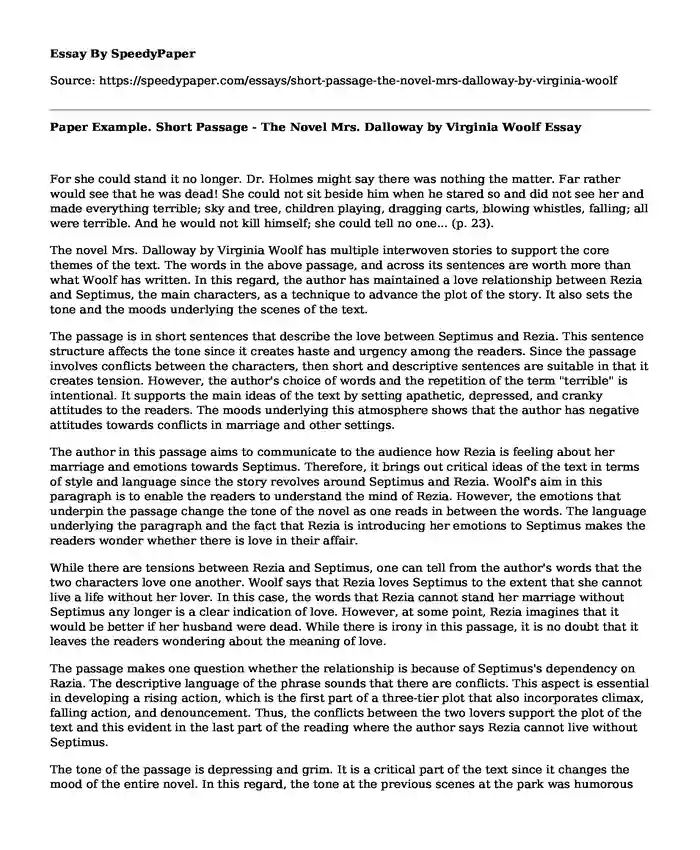
| Type of paper: | Essay |
| Categories: | Character analysis Books Writers |
| Pages: | 3 |
| Wordcount: | 751 words |
For she could stand it no longer. Dr. Holmes might say there was nothing the matter. Far rather would see that he was dead! She could not sit beside him when he stared so and did not see her and made everything terrible; sky and tree, children playing, dragging carts, blowing whistles, falling; all were terrible. And he would not kill himself; she could tell no one... (p. 23).
The novel Mrs. Dalloway by Virginia Woolf has multiple interwoven stories to support the core themes of the text. The words in the above passage, and across its sentences are worth more than what Woolf has written. In this regard, the author has maintained a love relationship between Rezia and Septimus, the main characters, as a technique to advance the plot of the story. It also sets the tone and the moods underlying the scenes of the text.
The passage is in short sentences that describe the love between Septimus and Rezia. This sentence structure affects the tone since it creates haste and urgency among the readers. Since the passage involves conflicts between the characters, then short and descriptive sentences are suitable in that it creates tension. However, the author's choice of words and the repetition of the term "terrible" is intentional. It supports the main ideas of the text by setting apathetic, depressed, and cranky attitudes to the readers. The moods underlying this atmosphere shows that the author has negative attitudes towards conflicts in marriage and other settings.
The author in this passage aims to communicate to the audience how Rezia is feeling about her marriage and emotions towards Septimus. Therefore, it brings out critical ideas of the text in terms of style and language since the story revolves around Septimus and Rezia. Woolf's aim in this paragraph is to enable the readers to understand the mind of Rezia. However, the emotions that underpin the passage change the tone of the novel as one reads in between the words. The language underlying the paragraph and the fact that Rezia is introducing her emotions to Septimus makes the readers wonder whether there is love in their affair.
While there are tensions between Rezia and Septimus, one can tell from the author's words that the two characters love one another. Woolf says that Rezia loves Septimus to the extent that she cannot live a life without her lover. In this case, the words that Rezia cannot stand her marriage without Septimus any longer is a clear indication of love. However, at some point, Rezia imagines that it would be better if her husband were dead. While there is irony in this passage, it is no doubt that it leaves the readers wondering about the meaning of love.
The passage makes one question whether the relationship is because of Septimus's dependency on Razia. The descriptive language of the phrase sounds that there are conflicts. This aspect is essential in developing a rising action, which is the first part of a three-tier plot that also incorporates climax, falling action, and denouncement. Thus, the conflicts between the two lovers support the plot of the text and this evident in the last part of the reading where the author says Rezia cannot live without Septimus.
The tone of the passage is depressing and grim. It is a critical part of the text since it changes the mood of the entire novel. In this regard, the tone at the previous scenes at the park was humorous and suddenly becomes sad with deeper emotions. The purpose of this transition is to enable the readers to predict an outcome of the relationship between Septimus and Rezia. Hence, it is no doubt that Woolf develops the novel's theme about the conflict in this passage since the story revolves around the relationship between the two characters. Moreover, the author gives background information about Septimus, and this tells the readers how insecure Rezia is in her marriage. Woolf writes, "Septimus had fought" (23) to enable the readers to flashback about Septimus during World War 1 and hence contributes to a sequence of a plot.
Conclusively, the passage foreshadows the outcome of the events to come, especially the wedding between Septimus and Rezia. It primarily conveys the theme of conflicts, and hence it supports a rising action, which is an integral part of the chronology of a three-tier plot.
Work Cited
Woolf, Virginia. "Mrs. Dalloway." Collected Novels of Virginia Woolf. Palgrave Macmillan, London, 1992. 33-176, https://ebooks.adelaide.edu.au/w/woolf/virginia/w91md/. Accessed 8 June 2019.
Cite this page
Paper Example. Short Passage - The Novel Mrs. Dalloway by Virginia Woolf. (2023, Jan 23). Retrieved from https://speedypaper.net/essays/short-passage-the-novel-mrs-dalloway-by-virginia-woolf
Request Removal
If you are the original author of this essay and no longer wish to have it published on the SpeedyPaper website, please click below to request its removal:
- Management Essay Example: Operations and Banking
- National Patient Safety Goals Essay Sample
- Free Essay Example on Spirituality Growth
- Free Essay Sample on the Evolution of Digital Art
- Character Analysis Essay: Hamlet Is a Man of Action
- Terrorism Essay Example
- Chemistry Essay Example about Chemical Properties and Atoms
Popular categories




